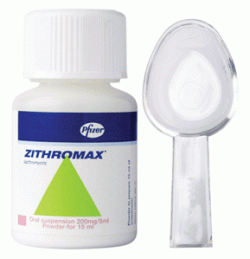Top Class Actions’s website and social media posts use affiliate links. If you make a purchase using such links, we may receive a commission, but it will not result in any additional charges to you. Please review our Affiliate Link Disclosure for more information.
A research article published in the prestigious Journal of the American Medical Association or JAMA has found that survivors of Stevens Johnson Syndrome have a massive increase in their risk of suffering SJS a second time. Medications such as the popular antibiotic Zithromax can trigger SJS.
Stevens Johnson Syndrome or SJS is an autoimmune reaction, a dangerous situation wherein the immune system malfunctions. In a healthy human, the immune system attacks bacteria, viruses, and other parasites that can harm the body. However, the immune system is very complicated, and like all complicated systems, it can misfire. In autoimmune diseases and reactions, the immune system mistakes the body’s own tissue for an infection and attacks with the same cellular machinery that usually handles germs. In the case of Stevens Johnson Syndrome, the body attacks the largest organ, the skin.
SJS symptoms start out mimicking the flu, and physicians often mistake the earliest stages of SJS symptoms for other disease. However, SJS symptoms rapidly escalate to a painful skin rash, with painful blisters, which give way to sores and ulcers. The rash can lead to widespread scarring severe enough to cause permanent disability. Additionally, the damage can spread to the eyes and even the internal organs of some patients, leaving survivors blind or suffering from permanently impaired organ function. And the most serious cases of SJS can escalate to a related disorder called Toxic Epidermal Necrolysis.
Toxic Epidermal Necrolysis or TEN is a more severe form of SJS. When the damage from SJS covers more than a specific percentage of the patient’s skin, doctors classify it as TEN. Patients with TEN face large patches of skin dying and sloughing off, leaving wounds similar to burns. Hospitals often treat TEN patients in their ICU’s burn wards, since TEN patients often face similar risks like dehydration, hypothermia, and deadly secondary infection. While all cases of SJS may be deadly, TEN patients have a mortality rate of 20 to 30 percent, higher than some strains of the Ebola virus.
Nearly all cases of SJS and TEN are triggered by reactions to drugs. It is very difficult for scientists and doctors to predict which patients will get SJS and TEN from which drugs. Azithromycin, or Zithromax, is among the drugs liked to exposure to SJS and TEN. And work published in JAMA has indicated that patients who had SJS once have a much greater risk of developing the reaction again than patients who have never suffered from SJS. This research is particularly troubling given the high popularity of Zithromax, also known as Zmax or Z-Pak.
SJS is rare, but the reaction is so deadly that medical science has an acute interest in the reaction. One study found that patients who suffered SJS once and survived had a thousand-fold increase in their risk of developing SJS again compared to patients who have never had SJS. This means that if a patient developed SJS from Zithromax and survived, their odds of developing SJS are a thousand times greater than the general population. SJS is rare enough that physicians may not realize this, so studies like the JAMA study are critical to improve awareness of the reaction.
SJS lawsuits have been filed by SJS survivors and their next of kin. SJS lawsuits are typically filed against drug companies that make drugs like Zithromax, though recent SJS lawsuits have been filed against hospitals that allegedly mishandled SJS cases. These SJS lawsuits allege that defendants failed to protect patients from the risk of SJS or respond adequately early on, leading to life-threatening drug reactions. SJS lawsuits typically seek to recoup the cost of medical care, lost wages due to illness, lost income potential due to permanent disability, and legal fees.
Do YOU have a legal claim? Fill out the form on this page now for a free, immediate, and confidential case evaluation. The Zithromax attorneys who work with Top Class Actions will contact you if you qualify to let you know if an individual lawsuit or Zithromax class action lawsuit is best for you. [In general, Zithromax lawsuits are filed individually by each plaintiff and are not class actions.] Hurry — statutes of limitations may apply.
Get Help – It’s Free
Join a Free Zithromax Class Action Lawsuit Investigation
If you or a loved one had a heart attack, liver failure, Stevens Johnson Syndrome or Toxic Epidermal Necrolysis after taking Zithromax, Z-Pak, Zmax or azithromycin, you may have a legal claim. See if you qualify by filling out the short form below.
A Zithromax attorney will contact you if you qualify to discuss the details of your potential case at no charge to you.
Oops! We could not locate your form.
ATTORNEY ADVERTISING
Top Class Actions is a Proud Member of the American Bar Association
LEGAL INFORMATION IS NOT LEGAL ADVICE
Top Class Actions Legal Statement
©2008 – 2024 Top Class Actions® LLC
Various Trademarks held by their respective owners
This website is not intended for viewing or usage by European Union citizens.













